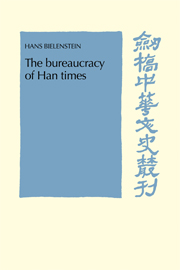Book contents
- Frontmatter
- Contents
- List of tables
- Preface
- Chronological table of emperors
- Abbreviations
- 1 The sources
- 2 The central administration
- 3 The local administration
- 4 The army
- 5 The salaries of the officials
- 6 Civil service recruitment
- 7 Power in government
- 8 Conclusion
- Notes
- Appendix: Official titles of the Han dynasties, Chinese–English
- Quoted literature
- Index
5 - The salaries of the officials
Published online by Cambridge University Press: 04 August 2010
- Frontmatter
- Contents
- List of tables
- Preface
- Chronological table of emperors
- Abbreviations
- 1 The sources
- 2 The central administration
- 3 The local administration
- 4 The army
- 5 The salaries of the officials
- 6 Civil service recruitment
- 7 Power in government
- 8 Conclusion
- Notes
- Appendix: Official titles of the Han dynasties, Chinese–English
- Quoted literature
- Index
Summary
It has been noted above (pp. 4–5) that the offices of the Han bureaucracy and their incumbents were ranked on an abstract scale. After the ranks of 800 shih, Equivalent to 800 shih, 500 shih, and Equivalent to 500 shih had been dropped in 23 B.C., and the rank of 10,000 shih had been added in 8 B.C., the scale consisted of eighteen ranks, from 10,000 shih at the top to Accessory Clerks at the bottom. While the scale must once have expressed annual salary in kind, it had ceased to do so and had simply come to signify official status. Salaries were fixed in relation to the scale, but not in direct proportion to it.
No complete salary list has been preserved for Former Han. The texts have only passing references to the incomes of some officials. Ju Shun (fl. 189–265) records that the Chancellor had a monthly salary of 60,000 cash (ch'ien), whereas the Grandee Secretary received 40,000 cash per month (HS 10:15b, Commentary). This refers to the time before the salaries of the Three Excellencies were made equal in 8 B.C. A memorial, written between 48 and 44 B.C., shows that officials ranking Equivalent to 2000 shih received a monthly salary of 12,000 cash, and officials ranking Equivalent to 800 shih the corresponding sum of 9,200 cash (HS 72:12a).
In 59 B.C., an edict stated that low salaries forced minor officials into corruption, and ordered that those ranking 100 shih or less should have their salaries increased by 50% (HS 8:17b–18a).
- Type
- Chapter
- Information
- The Bureaucracy of Han Times , pp. 125 - 131Publisher: Cambridge University PressPrint publication year: 1980



